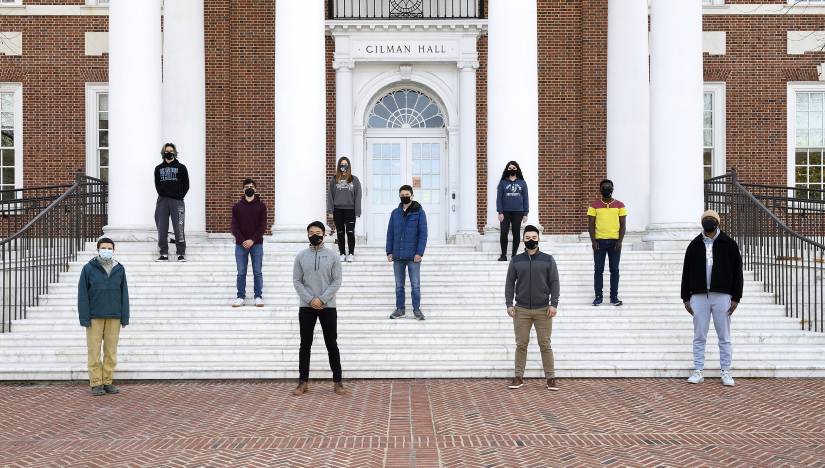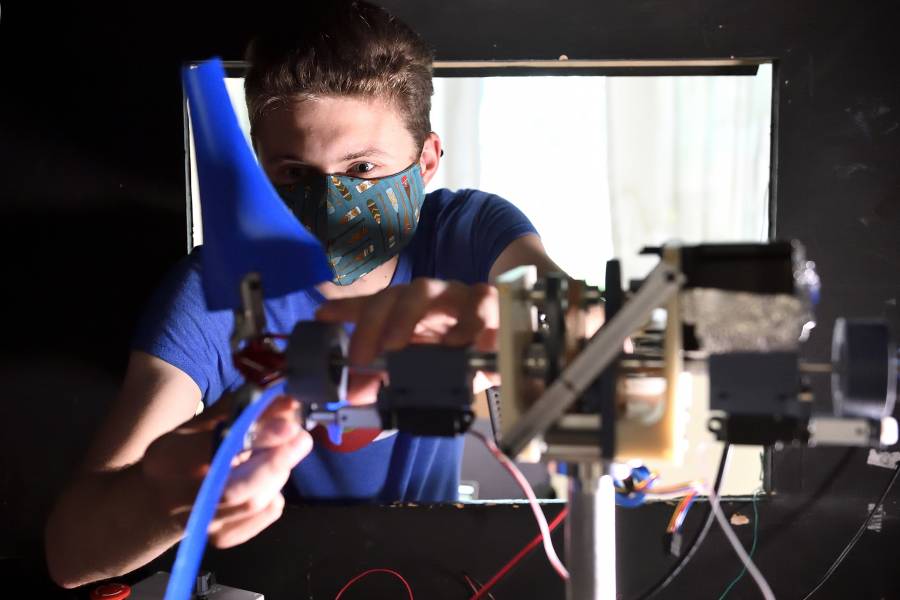A team of Johns Hopkins University students took home second place at this year's U.S. Department of Energy Collegiate Wind Competition, held as a virtual event June 2–11.
This was Hopkins' first appearance at the annual national competition, which challenged 13 undergraduate teams from around the country to offer solutions to a complex wind energy problem. Over the course of the academic year, the teams designed, built, and tested model wind turbines, developed wind farm project plans, collaborated with industry experts, and raised awareness of wind energy in their local communities. Hopkins came in just behind the team from Pennsylvania State University.
"Our team's goal was to build a strong foundation in wind energy topics, and I think we were all prepared to run with the middle of the pack this year. We were surprised and excited to have finished so well in our first competition. Every single member of our team worked so hard to bring ideas and designs to the competition, and to see that recognized was a great way to end the year," said Willa Grinsfelder, leader of the Hopkins Student Wind Energy Team and a mechanical engineering major who graduated in May.

Image caption: The Hopkins Student Wind Energy Team
Image credit: Will Kirk / Johns Hopkins University
The competition was held virtually for a second consecutive year due to COVID-19 pandemic. Instead of traveling to Indianapolis as originally planned, the Hopkins team members presented their hard work to a panel of industry judges from home. Despite delays and other obstacles presented by the pandemic, the Hopkins team performed well in multiple categories.
For Grinsfelder, the team's second place finish was a long-awaited success. She submitted the university's proposal for the competition in early fall of 2019 and then established the student-led Hopkins Student Wind Energy Team, recruiting undergraduates majoring in engineering, environmental science, management, and economics.
To prepare for the competition, the 25-member Hopkins team broke into sub-teams and focused on specific tasks, such as turbine blade design, financial analysis, safety protocols, and policy grounding. Pandemic-related campus closures forced the team members to adjust the ways they worked and find new ways to collaborate.
Grinsfelder led the sub-team that designed and built a miniature dual-rotor, counter-rotating wind turbine capable of harvesting more energy from wind in a smaller space. Members made videos of themselves testing their wind turbine in Maryland Hall's wind tunnel for the judges.
Another sub-team focused on researching and developing a plan for a hypothetical 100-megawatt wind plant in western South Dakota. Members analyzed various factors including wind potential, infrastructure, environmental impact, and government policy to present a project development proposal complete with a financing plan. With guidance from experienced industry mentors, the finance sub-team was able to implement multiple unique financing strategies, giving Hopkins a leg-up in the competition.
"We all joined the team knowing very little about project development, but the competition was a great opportunity to learn through hands-on experience with tremendous support from our industry mentors. We're very excited to tackle next year's competition and continue developing our knowledge base," said Dong-Woo Seo, a fourth-year chemical and biomolecular engineering major.
The team's strong finish in the competition exemplifies Hopkins students' growing interest in wind and renewable energy, said Grinsfelder. And that's a good thing, because Johns Hopkins has already been selected to participate in the 2022 Collegiate Wind Competition in San Antonio, Texas.
"A great thing about the Hopkins Student Wind Energy Team is that it gives senior members an opportunity to mentor underclassmen and pass on what they've learned. We're really excited about building this network, and to see our members have continued success at future competitions," said Grinsfelder.
Posted in Science+Technology, Student Life, Alumni








